Taxes
| Newer Posts |
Owners of Rental Property in Harrisonburg: Get ready for more IRS paperwork! |
|
 Thanks to one of my clients, who pointed this new regulation out to me.... If you own rental property, you must now submit a 1099 form to the IRS and to service providers if you pay $600 or more for the provided service -- such as to a plumber, carpenter, painter, landscaper, etc. Apparently, the basis for this requirement is to make sure that contractors are not hiding their income. Requiring that this information from rental property owners will (potentially) reveal more income that should be taxed. This goes into effect for 2011 rental property income and expenses, so start keeping detailed records, if you're not already. Do you love legislation and taxation? Read more about the Small Business Jobs Act of 2010, which enacts this new requirement. | |
6,500 Reasons Why It's Great If You Have Owned And Lived In Your Home For Five Or More Years! |
|
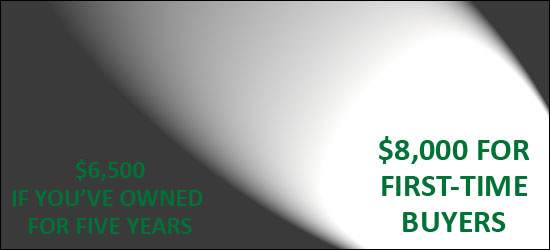 Somehow, the $8,000 tax credit for first-time buyers is getting all of the attention, meaning that most people don't even know about the $6,500 tax credit available to you if you've lived in your home for five years. If you have owned your home for five or more years, you will (almost certainly) receive a $6,500 tax credit if you buy your next home by April 30th, 2010. To clarify -- you must have a contract on the house by April 30th and close by June 30th. Many people that I talk to who would be eligible for this $6,500 tax credit don't even know that it exists. If you're in this situation and planning to buy a new house in 2010, you really ought to consider making a move in the first four to six months of the year. Click here for more information (from the IRS) about both tax credits. Again, to try to really drive this point home: If you've owned your house (and lived in it) for more than five years, you are very likely eligible for a $6,500 tax credit if you buy a new home by the spring/summer. | |
We're Seeing The Effects Of The $8,000 First Time Buyer Tax Credit In Harrisonburg, Rockingham County! |
|
I rarely make real estate sales predictions --- mainly because in the rare occasion that I do, I'm usually wrong. More on this in a few days. That being said, I believe we're seeing the specific effect of the $8,000 first time buyer tax credit (that was recently extended) here in Harrisonburg and Rockingham County. Check out how November sales figures will likely play out . . . 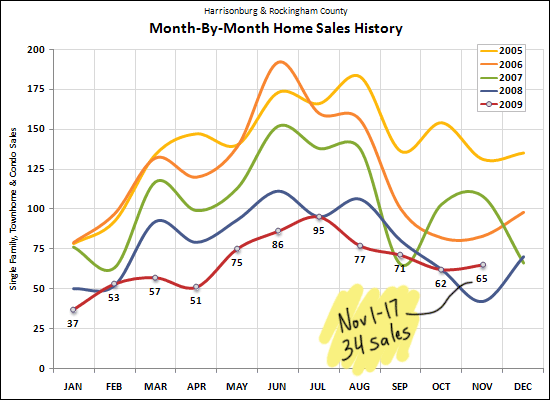 We've already seen 34 home sales in Harrisonburg and Rockingham County in the first 17 days of November. Compare that to how many occurred in Nov 1-17, 2008 versus Nov 18-30, 2008, and I have extrapolated a final sales count of 65 home sales this November. I will likely be wrong --- I think it will be even higher. The second version of the first time buyer tax credit was to end on November 30th, so there are quite a few purchasers already in the queue waiting to close at the end of this month. Do you want further evidence? The median sales price of the homes that have sold this month is $177,623, compared to the year to date median of $190,000. We're seeing more inexpensive (first time buyer type) homes selling this fall. Any counter prediction out there? What do you think? And what do you think we'll see in those typically stagnant months of December and January?? | |
Has The First-Time Buyer Tax Credit Pulled More Buyers Into The Market In Harrisonburg, Rockingham County? |
|
Warning: This analysis, though numerically and statistically based, is an abstract answer to a nearly impossible question. 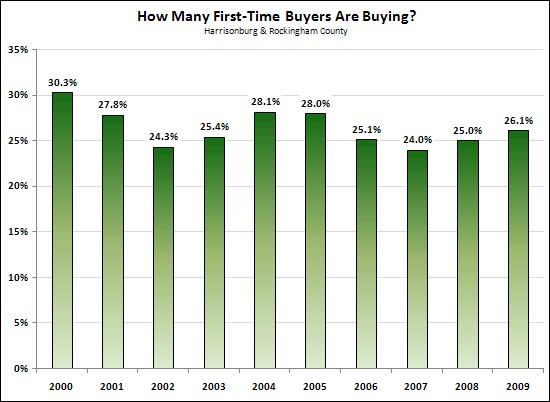 The question, raised today by Chad, is whether the first-time buyer tax credit (that was set to end on November 30, 2009 but has now been extended) has pulled any additional buyers into the market. I say.....maybe, but.... The chart above shows how I attempted to answer that question. For each year between 2000 and 2009, I determined the percentage of home sales that were at or below 80% of the median sales price that year. We can assume that most first time buyers are going to be in that general price range (under $93k for 2000, and under $152k for 2009). The chart, thus, shows how that segment of the market has fluctuated in relative size over the decade that is coming to a close. As you'll notice, the portion of supposed first-time buyers dropped off between 2005 and 2007 --- likely because home prices were increasing (mostly between 2005 and 2006) and lending requirements were becoming more restrictive (mostly between 2006 and 2007). But....the trend then reverses starting in 2008, and then continues in that new trajectory in 2009. There are thus (perhaps) more first-time buyers in our market today because of the tax credit, then there otherwise would have been. Yes, I know --- lots of mental leaps there. The additional caveat that I offered Chad is that while I believe the first-time home buyer tax credit did and is pulling buyers into the market now who might have otherwise waited until 2010 or 2011 to purchase --- I also think there have been first-time buyers that would have purchased in 2008 and 2009 that were waiting because of the economy. Thus --- the tax credit is borrowing buyers from the future who really would have been today's buyer anyhow. Again --- all of this is largely speculative, as I can't truly tell you the number of first-time buyers in our market, but hopefully this analysis sheds a bit of light on the topic. I welcome your suggestions for additional analysis to answer this question. | |
Several More Months Of An $8,000 First Time Buyer Tax Credit PLUS A New $6,500 Tax Credit For Long Time Residents Of Same Principal Residence |
|
THE NEW TAX CREDIT IS COMING, THE NEW TAX CREDIT IS COMING! The House has passed the bill, as has the Senate, and the President may sign it as soon as tomorrow (November 6, 2009). That's right --- the tax credits for home buyers are continuing --- and now they are being applied more widely. FIRST-TIME BUYERS You now have several more months to buy your new home --- you don't have to close by Nov 30 / Dec 1. In fact, as long as you have the property under contract by April 30, 2010, you'll have until July 1, 2010 to close on the property. The tax credit is still $8,000 with several imitations on income, home price, etc. LONG TIME RESIDENTS OF SAME PRINCIPLE RESIDENCE There's something for you too! If you have owned and used the same residence as your principal residence for 5 (consecutive) years out of the last 8 years, you will likely be eligible for a $6,500 tax credit. The deadline for closing is July 1, 2010 (as long as the property is under contract by April 31, 2010.) TIMING One important note here on timing --- if you're a first-time buyer, this new bill just extends your deadlines. If you're a "long time resident of same principle residence" you'll can close on your new house (and be eligible the tax credit) as soon as the bill is signed into law. That is to say that if you're a move-up (or down) buyer ready to close tomorrow (November 6th), you might want to wait another few days for the President to sign the bill. You'll enjoy an additional $6,500 net gain --- in the form of a tax credit. INCOME LIMITS The new income limits are $125,000 for single buyers and $225,000 for couples. THE ACTUAL LEGISLATION Interested in the details of the actual bill? Click here. | |
How Much Will I Pay In Capital Gains Taxes When I Sell My Investment Property? |
|
 First, here's how to calculate your gain or loss on the sale of your investment property.... Selling Price - Purchase Price - Purchase Costs - Improvements - Selling Costs + Depreciation You may have heard of short-term and long-term capital gains --- the difference is in the timing.... If you sell an investment property within one year (including one year exactly) of purchasing it, your "short-term capital gain" will be taxed at the same level at which your ordinary income is taxed. This could be at a rate as high as 35%, but depends on your income level. If you sell an investment property after one year of owning it, your "long-term capital gain" will be taxed at either 0% or 15%. If you (as an investor) are in the 10% or 15% income tax bracket, you will pay 0% (yes, that's right, no taxes) on your long-term capital gains. If your income tax bracket is above 15%, you will still only pay 15% tax on your long-term capital gain. This is important to note, as an investor might pay a 25% tax on their ordinary income, but can pay significantly less (only 15%) on their income (long-term capital gains) on investment properties in that year. Of note, these tax rates (0%, 15%) only last through the end of 2010 given current legislation on the books. If they aren't extended, they will revert back to the previous tax rates of 10% and 20%. | |
If you're a first time home buyer, you'd better start looking more seriously now -- the clock is ticking! |
|
If, as a first time buyer, you close on your purchase of a home by November 30, 2009 you will receive an $8,000 tax credit on your 2009 taxes. That is to say that:
Most homes take 45 to 60 days to "close" -- in other words, it is usually 45 to 60 days after a house is under contract that the closing can take place. That means first time buyers ought to have their house under contract by September 30th in order to have time to close. And if you're planning to have a contract on a house before September 30th, NOW is the time to start looking. Lots of first time buyers are certainly in the market right now --- I'm working with quite a few, and I hear stories of many others as well who are buying --- but I believe there are quite a few other first time buyers who are still sitting on the bench. If you have questions about the $8,000 first time buyer credit, or if you're ready to start looking at properties, call (540-578-0102) or e-mail (scott@HarrisonburgHousingToday.com) me and we'll get started! | |
Don't forget about the $7,500 tax credit |
|
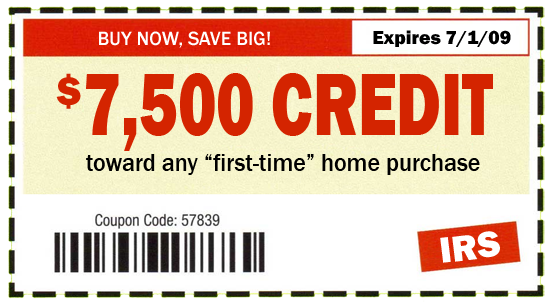 In talking to one of my clients today, he commented that he thinks a lot of potential buyers have forgotten all about the $7,500 tax credit. I agree! Here is a quick reminder of the basics... If you haven't owned a home in the past three years, you have a great opportunity to save $7,500 on your 2009 income taxes. To pull of this credit you'll need to buy a home before July 1, and you'll then be able to claim the $7,500 tax credit on your return that you would file at the beginning of next year. There is some fine print, available at the IRS web site, which includes the fact that you will be paying the $7,500 back over a 15 year period. It is rumored that the repayment aspect of this tax credit may disappear as a result of upcoming economic stimulus changes, and even if it doesn't, you still will have a net savings of over $4,000. | |
The time-value of an interest free $7500 loan to first-time home buyers |
|
Over the past few weeks I have been explaining to many first time home buyers that if they buy a home before July 1, 2009 they can take advantage of a $7,500 tax credit. Some, though, have been less than enthused because the full $7,500 tax credit has to be repaid over 15 years. Yes, that's right --- even though you will pay $7,500 less in taxes for the tax year in which you make your first home purchase, you do have to repay these tax savings in years three through seventeen. I thought I'd take a look at the value of what is essentially an interest free $7,500 loan. For this analysis, I am examining the aggregate savings from not paying interest on the $7,500, using a current interest rate of 6%. 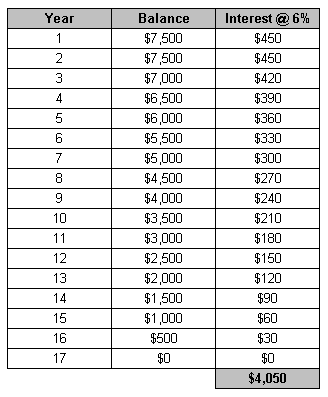 As you can see --- over the course of the 17 years, you save a total of $4,050. Thus --- even though you are paying back the $7,500 tax credit, it is still at a significant ($4,050) savings. | |
Real Property Tax Semantics (City of Harrisonburg) |
|
Currently, property owners in the City of Harrisonburg are taxed at a rate of $0.59 per $100 of assessed value. In other words, a $225,000 home is a tax liability of $1,328 per year. Thus, since real estate values almost always increase in Virginia, unless the City lowers its tax rate, taxes will also almost always increase! And so, this year (2008), the City of Harrisonburg finds itself going through the process of notifying Harrisonburg property owners that they are proposing a real property tax increase. No, they aren't increasing the tax rate ($0.59), but the effective taxes will increase because of increased property values. Here are the details of the changes in the City:
Do you have questions or opinions about this tax increase? You are welcome to voice them here on my blog, in the comment section. Additionally, a public hearing will take place on May 13, 2008 at 7:00 PM in the Harrisonburg Council Chambers located at 409 South Main Street, Harrisonburg, Virginia. | |
Increased Rockingham County Property Taxes in 2008? |
|
The current tax rate for real estate in Rockingham County is $0.58 per $100 of assessed value. ($200k home / 100 * .58 = $1,160 annually). The proposed budget for the 2008-2009 fiscal year would increase property tax rates for the 2008 calendar year by $0.02 to $0.60 per $100 of assessed value. ($200k home / 100 * .60 = $1,200 annually). To see for yourself, scroll through the budget below until you get to the bottom section where I have circled the tax rates in red. For a more detailed view, click on the budget to download a larger image. To inspect the budget, visit the County Administrator's Office at 20 East Gay Street in Harrisonburg. To provide feedback to the Board of Supervisors, attend the public hearing on April 9, 2008 at 6:00 p.m. at Turner Ashby High School, in Bridgewater.  | |
Assessed Values - What and Where . . . |
|||
The assessed value of a property is the value assigned to the property by the local assessor's office, for the purpose of determining how much you will pay in taxes. Harrisonburg has a great "Understanding Assessments" guide on the Commissioner of the Revenue section of their web site. How to determine the assessed value of a property: For Harrisonburg, visit the new Real Estate Information System to view assessed values for properties, and lots of other property information. For Rockingham County, visit their GIS web site, where you can search for a property, and obtain its assessed value. Additionally, if you have trouble with either of these systems, feel free to e-mail me (scott@cbfunkhouser.com) --- I look up assessed values quite frequently, through both of the systems above, and through the MLS. I'd be happy to look up a property for you and e-mail you back with the assessed value. Real World Assessments Let's take a look at a few real world assessments compared to recent sale prices to see how they compare, starting with the three real estate closings from the past few weeks in our MLS for Harrisonburg . . .
It becomes clear that there is not a magical percentage that can be used to determine the market value of your home based on assessed values. Finally, here's one example of a house (that I am marketing) that is for sale at a price below the appraised value: 6210 Dotts Lane, Penn Laird (click here for details) Asking Price = $319,000 Assessed Value = $333,200 With amazing views, a large lot, a private neighborhood, schools in close proximity, superior construction quality, and a price below appraised value, it is a great opportunity! | |||
Pay Reduced Capital Gains Taxes If Your Job Makes You Move |
|
 Capital gains are gains on assets that had been held for over one year before being sold. Roughly speaking, if you purchased your home for $200,000 and are selling it for $250,000 you have netted $50,000 of capital gains. This profit is taxable, with one significant exclusion. If, in the 5-year period ending on the date of the sale, you have: Capital gains are gains on assets that had been held for over one year before being sold. Roughly speaking, if you purchased your home for $200,000 and are selling it for $250,000 you have netted $50,000 of capital gains. This profit is taxable, with one significant exclusion. If, in the 5-year period ending on the date of the sale, you have:- Owned the home for at least 2 years (the ownership test), AND - Lived in the home as your main home for at least 2 years (the use test). then you will generally only be taxed if your gain is more than $250,000 ($500,000 if married filing a joint return). Yes, you really are exempt from any and all taxes on this profit. If you are selling your home less than two years after you bought it, or within two years of selling another home and claiming a capital gains exemption, you may still be able to reduce the amount of gain upon which you will be taxed. This is possible if you sold the home because of: - a change in place of employment - health - unforseen circumstances Per the IRS, "For this purpose, employment includes the start of work with a new employer or continuation of work with the same employer. It also includes the start or continuation of self-employment." The only other stipulation on the change in place of employment is that the move is greater than 50 miles. The IRS has volumes of information on this topic located here --- where you'll even find the worksheet and calculations to use to determine the amount of your potential tax liability. | |
| Newer Posts |
Scott Rogers
Funkhouser Real
Estate Group
540-578-0102
scott@funkhousergroup.com
Licensed in the
Commonwealth of Virginia
Home Search
Housing Market Report
Harrisonburg Townhouses
Walk Through This Home
Investment Properties
Harrisonburg Foreclosures
Property Transfers
New Listings

